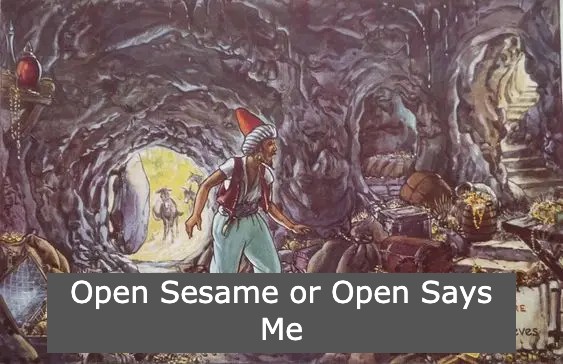Is it Open Sesame or Open Says Me? The correct phrase is “open sesame,” which comes from the ancient Arabic story of Ali Baba and the Forty Thieves.
In it, the poor woodcutter, Ali Baba, encounters a group of thieves entering their den using the password, “open sesame.” “Open says me” is a parody of the expression used by Popeye, and is not the correct phrase.
“Open sesame,” with the second word being pronounced “ses-ah-me.” The other option, “open says me,” is a joke version of the phrase that plays on the sound of the original one. So where do these two phrases come from and what do they mean?
Open Sesame Origin: Ali Baba and the Forty Thieves
The expression, “open sesame,” comes from Ali Baba and the Forty Thieves – possibly an ancient Arabic folk tale that is now included in the book of Middle Eastern folk stories called One Thousand and One Nights.
Its exact origin is unclear, however, and there are many who believe that the story was written in the 1700s by the man who first published it, Antoine Galland, despite the fact that he attributes it to a Syrian storyteller.
Originally, the story was probably only told verbally, and passed down from storyteller to storyteller for generations. However, the true origin of the story is shrouded in mystery, which only adds to the mystery of its best-known phrase, open sesame.
In the story, Ali Baba is a poor woodcutter who is both an honest man and one without greed. One day in the forest, he overhears a band of thieves talking, and watching them, sees them enter a cave full of treasure using the password “open sesame.” Once they have left, he enters the cave using the passphrase and takes one small bag of gold to help him support his family.
Upon finding out about Ali’s new wealth, his greedy brother forces the information out of Ali and goes to the cave himself to steal as much treasure as he and his donkey can carry. In his excitement, Ali’s brother forgets the password to get out of the cave. He desperately tries the names of other grain plants, but fails, and is caught by the thieves and killed.
Ali then retrieves his brother’s body from the cave, which alerts the thieves to the fact that somebody else knows about it. Through a series of unfortunate occurrences, the thieves find out who it is, and they plot to kill Ali. However, his faithful slave girl ruins their plans every time they try, saving the lives of Ali and his family and eventually killing off all the thieves.
The result of her actions is that Ali is now the only person who knows the location and password of the cave and all its hidden wealth. In gratitude, Ali frees the slave girl and offers his son to her in marriage.
Open Sesame Meaning
“Open sesame” is a sort of magical phrase that commands something to open. We use it to express our desire for something to open for us, like a stubborn jar or a stuck door. Similar fictional words include “abracadabra” and “alakazam.”
Why the word sesame is used is quite contested, and many people have posted their opinions online without knowing the true answer, which makes it difficult to determine which answer, if any, is correct.
However, the most logical explanation is that it refers to the sesame plant – the oilseed grain whose tiny white seeds so often grace the tops of our hamburger buns.
The seeds grow in a pod that bursts open when they are ready, revealing their treasure to the world like the wealth Ali gets after saying “Open sesame”. This theory makes sense because the sesame plant is revered and very widely used in Arabic cooking.
The original phrase was most likely “khul ja simsim,” which translates to “open sesame.” The first word, “khul ja,” means “open” in Hindi, and the second word, “simsim,” is the Arabic word for the sesame plant.
Other Origins Guess
There are some other theories about the origins of the phrase, “open sesame,” including:
- The Hebrew word for “password” – סיסמה (sisma) is the Hebrew word for password, and sounds quite similar to sesame. This theory is unlikely, however, because sisma is a more modern word, seldom found in older texts.
- Mount Semsi in Grimm’s Fairytales – in an old Germanic story that is very similar to the Ali Baba story, a man sees a group of thieves open a mountain by saying, “Mount Semsi, Mount Semsi, open thyself.” This story has a very strong similarity to that of Ali Baba, but since the Grimm story came later, it is more likely that “Semsi” was copied from “sesame,” not the other way around.
- Open sesame is a bastardization of “open says me” – this is very unlikely since the original story, wherever it came from, was not told in English. The expression would have had no similar sound to any English phrase in the original storyteller’s language.
Where Does “Open Says Me” Come From?
In a parody of the Ali Baba story, Popeye the Sailor Man stands in for Ali Baba and uses the phrase “open says me” to open a can of spinach and save himself from the thieves.
In this case, it is a joke phrase that plays on the sound of the English password, but since the original story would likely have been in Arabic, there is no connection between this parody phrase and the original story.
Conclusion
The right phrase is “open sesame”. The true origin of the phrase may have been lost to time, but the best guess is that it comes from the words “khul ja,” which means “open,” and “simsim,” which refers to the sesame plant that reveals its treasure when its seed pods burst open, like Ali find the treasure after saying “Open sesame”.





